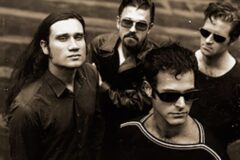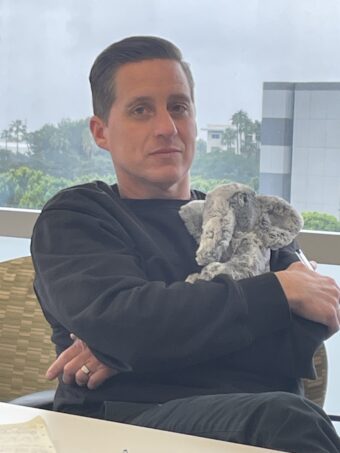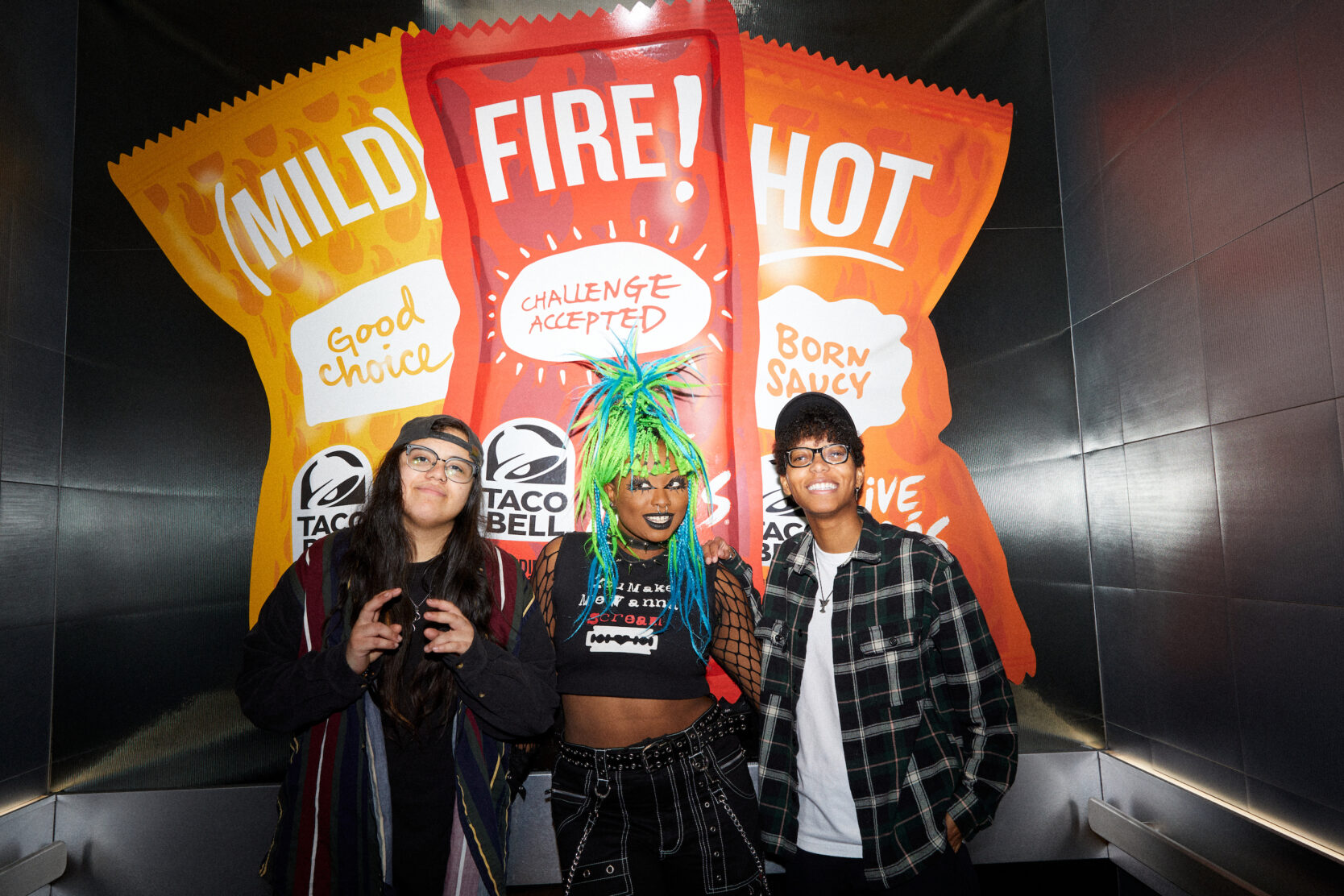Dave Navarro is standing on a rooftop in New York City.
“Taco Bell is a brand that believes in Living Más,” he tells the contestants fidgeting before him. “Doing more and expecting more, and getting a little more out of every day.”
He really milks the end of the sentence with just enough of a rising, announcer-like vocal inflection, making it clear that this is a commercial within a 2014 episode of tattoo reality show Ink Master.
“Just by having the guts to be in this competition,” he adds, “you are all examples of the Live Más mentality.”

Also Read
30 Overlooked 1994 Albums Turning 30
It’s a clunky plug. Taco Bell has wedged its way into the show with that line, becoming something of a meme and an easy way to poke fun at the brand. But even while the Internet clowned Navarro—and, to some extent, the fast food chain—it also suggested that Taco Bell was sorta trying to have its finger on the pulse of cool music.
Within the last few years, as Gen Z has discovered hardcore and Turnstile has become a big-name rock band—touring with newly-reconciled Blink-182 and landing on just about every festival poster within the last two years—you might’ve noticed commercials featuring songs like “Holiday” or “T.L.C.” off their improbably big 2021 album, Glow On. Or maybe you noticed garage-glam rockers White Reaper’s “Getting Into Trouble w/ the Boss” from this year’s Asking for a Ride, or pop-punk act Meet Me @ the Altar’s “Say It (To My Face),” or hardcore quintet Scowl’s “Opening Night,” all soundtracking some montage introducing a new Mexican-inspired menu item.
There are myriad reasons why this would be, as the kids say, cringe. And yet, it’s not.
How is it that Taco Bell has managed to do what so many other brands before it—in both the fast food space and, largely, in the overall business space—have failed to do? How did Taco Bell, by using these bands, create an aura of cool around itself, allowing it to transcend the realm of “How do you do, fellow kids?”
The short version, at least at first, is free food—and a lot of it over time.
The Feed the Beat program started in 2006 as a way for touring artists to, well, eat when there wasn’t much money coming in on the road. Bands like Thursday were early pioneers of the program, connecting new artists with a way to make touring a little more feasible and, at the same time, create a connection with the brand—maybe just in case they “made it.”

Jon Landman, mastermind behind Feed the Beat and CEO of marketing agency The Syndicate, which works with Taco Bell on choosing the music for its ads, says Feed the Beat—and, by extension, the relationships Taco Bell forges with bands—comes from an organic desire to literally help fuel the artists.
“I think the folks at the brand were always kinda of the mindset like, ‘What can we do to help musicians?’” Landman says. It was just a way to assist bands driving between major points on the map without culinary hubs en route.
“We love music,” he says. “Music is an everyday part of our lives. How does a food brand work inside of this? And I think, really quickly, it was, ‘Let’s just give artists free food. They’re going to Taco Bell anyway. Let’s just hook them up with free food.’”
But what’s the catch? It’s naive to think that a company of this scale is truly that altruistic. It’s also natural to feel cynical and remember Benjamin Kane, Rob Lowe’s slicked-hair businessman in Wayne’s World, telling Wayne and Garth he’s such a fan—and then gutting the show, turning it into some bastardized version of its past self through shitty sponsorship and a watered-down theme song.
But while talking with Landman, and then Tim Bergevin, Taco Bell’s Vice President of Influencer and Community Marketing, the story remains the same. It really seems like they just want to support bands they like. If that creates a connection with the brand where they could give them a platform on a commercial, that’s an added bonus.
“I think for us to work with any artist, that begins and ends with someone who has a connection point, and also a connection point to the brand,” Bergevin says. “I think that’s really the biggest thing.”
Maybe our new wave of hardcore fandom aligns with a generation more sympathetic to the notion of placing your music in a Taco Bell ad. In 2023, there are plenty of fans who consider this kind of commercial exposure a net positive for the genre. (Even on the r/Hardcore subreddit, a lot of the comments are basically saying “good for Turnstile, get that money.” There’s still, inevitably, occasional feedback like “gross” and “Stop calling Turnstile Hardcore. They’re 4th Mealers now.”)
It’s impossible, too, to ignore the symbiotic nature of this marketing relationship. While Meet Me @ the Altar got the call to perform on Colbert shortly after their spot aired, Taco Bell was able to keep building what both Landman and Chip Herter—vice president and music director for creative agency Deutsch LA, which works with Taco Bell on choosing the music for ads—call “thoughtful intentionality.” It’s a very modern marketing-speak term, but essentially it just means brand-building, choosing things that fit in with a carefully cultivated aesthetic built over years, which Herter calls Taco Bell’s “sonic identity.”
Whether or not it comes from a genuine fandom and appreciation, a band’s cred with the kids also bleeds into Taco Bell’s reputation. Last November, when the “HOLIDAY” ad first debuted, a video of Henry Rollins—no stranger to calling out what he perceives as bullshit—surfaced, basically claiming that corporations using punk and alternative music isn’t a case of selling out, but rather an indication that the young, alternative-minded people are the ones calling the shots (i.e., they are now the target buying demographic).

From the band’s perspective, it begs the question whether they have any qualms about linking up with a company as big as Taco Bell, who might use their art for monetary gain without caring what happens to it. But when artists are paid virtually nothing from streaming, the concern of corporate sponsorships isn’t as prevalent.
Even if there was a concern, the whole “free food” thing has given the bands a reason to work with them—to trust them.
“Taco Bell has always had our back because, as touring musicians, it’s basically the only thing that’s open after we’re done playing a concert,” says Téa Campbell, guitarist of Meet Me @ the Altar. “So we’re no strangers to Taco Bell. We get Taco Bell so often on tour. So it was really, really cool for us to hear that they wanted to involve us in what they’re building.”
Tony Esposito, singer-guitarist of White Reaper, remembers meeting Bergevin at a gig in Boston, and he was far from the cartoonish “suit” that you might picture.
“He came to a show that we were playing in Boston, and we met him, and he was just a pretty young guy, tatted up, dressed like we did,” Esposito says. “It made a lot of sense that he knew who Militarie Gun was, who White Reaper was, you know? He was just a punk dude that worked for Taco Bell.”
“Taco Bell is a brand that loves to be in culture,” Herter says. “Sure, they’re a [quick-service restaurant], but they also really love to be embedded in culture. Because of that, it sort of attracts people who themselves also like to be in culture. … What I think the Turnstile sync did for us is it showed us that you can break a mold of that formula and get such a positive response from the fans of that band and the fans of Taco Bell that the risk comes with a reward.”
The reward is a brand where we hear Militarie Gun and Mannequin Pussy in a commercial for a giant company and we don’t bat an eye. It makes sense. And despite a clear playbook working out for Taco Bell, the competition can’t really copy it. They would have had to start years ago. (“I don’t even know what music plays on a McDonald’s or Wendy’s commercial,” Esposito says, before deadpanning, “The Whopper song was pretty fucking sick that Burger King did.”)
After those years of Feed the Beat, Taco Bell might have reached a time where the public perception of partnering with a corporation isn’t met with as much disdain as it has in the past. It’s a time also where the Internet denizens who may have written all sorts of “Fuck Turnstile” posts in the past are now congratulating them for securing the bag and spreading the gospel.
“We wouldn’t say yes to just anything,” Campbell says. “Of course, if a brand that we feel we’re aligned with would want to use our songs, that would be awesome. But Taco Bell specifically, with Feed the Beat, they’ve already shown us support, and we just love everything that they’re doing, especially with music, because they’ve been doing that for a long time. They’re helping keep smaller bands alive, really.”
And while Fat Mike can sing about how he wants conflict and dissent, there’s not a whole lot of that going on at Taco Bell HQ, it seems.
“Maybe we are corporate,” Herter says. “But we’re also out there literally in the mosh pits and love it.”
That time in the pits might’ve knocked something loose in the corporate guys’ brains—maybe they realized that the most effective way to reach the kids isn’t an aging rock star reading ad copy so badly that you could practically see the teleprompter reflected in his sunglasses. It was having them say nothing about the brand at all, aside from the words they’re singing. Just doing their thing with a well-placed logo somewhere nearby—sponsorship in the same way a pro skateboarder is a kickflipping billboard, allowing us to suspend our understanding of the corporate structure behind the radical scenes.
Dave Navarro isn’t standing on any rooftops telling us about the values of Taco Bell anymore, but that doesn’t mean we’re not aware that what we’re seeing is still a commercial when White Reaper is playing. That episode of Ink Master was years ago. The world has changed since then. We’re still aware it’s an ad, but do we really care?




